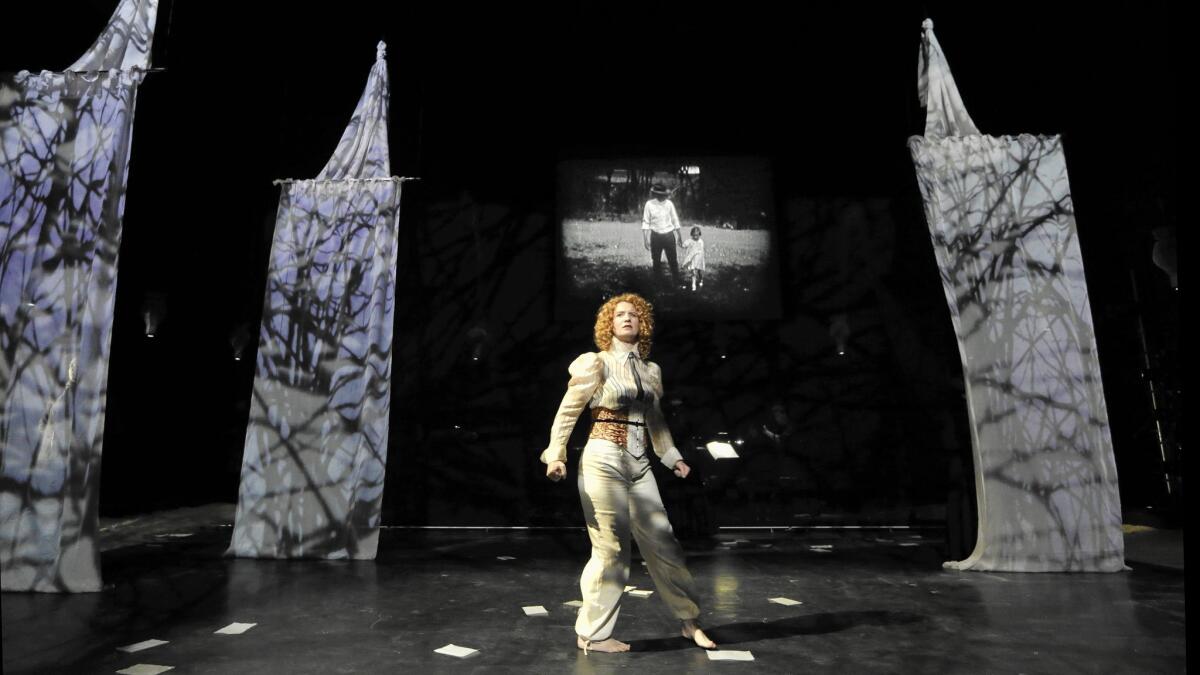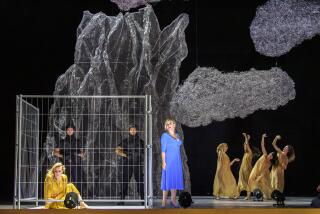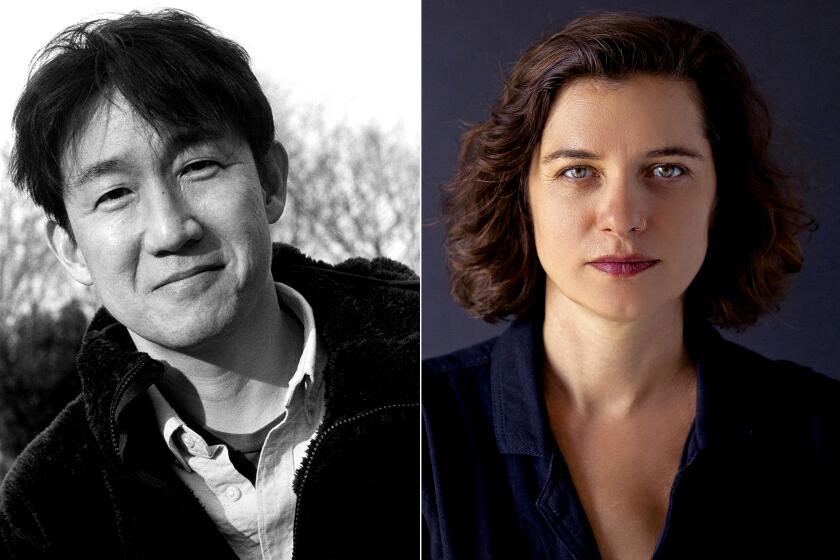Review: Mezzo-soprano Abigail Fischer overcomes all challenges in ‘Song From the Uproar’

Los Angeles Opera’s Off Grand series of new work performed in small spaces may not have moved physically more than a few steps around the corner from Grand Avenue on Thursday night. But at least on this evening, Missy Mazzoli’s “Song From the Uproar” at REDCAT made L.A. Opera the hip Music Center resident compared with the more commercial fare that happened to be playing in the other venues.
Now in her mid 30s, Mazzoli is one of the most successful composers on the Brooklyn scene. “Song From the Uproar,” which had its premiere three years ago at the Kitchen in New York, is her first opera. Her wonderful score is seductive, meditative, spiritually elusive and subversive. With it, we can welcome a new natural for the art form.
Mazzoli’s subject is also a natural. The opera’s full title is “Song From the Uproar: The Lives & Deaths of Isabelle Eberhardt.” A Swiss writer at the beginning of the 20th century, Eberhardt lived her short life as though she were an opera character. At 21, she went to Algeria, where she dressed as a man, became a Sufi, fell in love with an Algerian soldier, survived an attempted assassination and failed suicide pact but drowned in a flash flood at 27.
SIGN UP for the free Essential Arts & Culture newsletter >>
Although Eberhardt published journalism that chronicled the abuses of the occupying French army in Algeria as well as a few short stories, her most intriguing writing was her journals, most of which were lost in the flood.
What remains are fragments, and these proved the basis for Mazzoli and her co-librettist, Royce Vavrek, for making a fragmentary one-woman opera that consists of 15 songs.
The staging painstakingly alternates Eberhardt’s “Lives” and “Deaths,” namely her losses or close calls and survivals and renewals. It was created for the original Kitchen production and comes courtesy of Beth Morrison Projects, L.A. Opera’s New York partner in its Off Grand enterprise, and some of its missteps are easier to overlook than others. But a first opera is a first opera. The news is Mazzoli’s music and an enthralling performance by Abigail Fischer, one of the rising stars of new music.
The homepage of the mezzo-soprano’s website quotes three East Coast critics, who call her “luminous,” “spellbinding,” and “sumptuous.” I’ll take all three adjectives. And I’ll take them realizing that the odds in the production by Gia Forakis are against Fischer. She is asked to gratuitously telegraph emotions. Poetry is mistrusted. Mystery is made into melodrama.
The stage is meant is to be an immersive environment with film projections on a small rear screen, on scrims in front and behind the stage, and on hanging curtains. Much of this is beautifully done. Yet the black-and-white imagery, stock footage of a woman and family life, the sea, appears to come from a decade or two or three after Eberhardt’s era. Dressed in what looks like a modern-day Brooklyn tag-sale version of Victorian fashion, the enigmatic Eberhardt comes off as an everyday over-emoter.
The amplification proved another problem. Rather than employ REDCAT’s musically plush sound equipment or take advantage of the space’s sophisticated acoustical possibilities, the production team used a reflective set-up for acoustic music rather than the absorptive panels for electronics. Fischer, a five-member chorus and the five-member instrumental Now Ensemble were blasted at artificial volumes and with crude balances. Some amplification was clearly required, since Mazzoli produced a haunting prerecorded electronic soundscape and includes an electronic guitar in the ensemble. There was also the need to drown out a noisy rented projector. But the sound design at REDCAT was fake, and there were the added confusions of an unintentionally crackling microphone and Mazzoli’s intentionally crackling prerecorded atmosphere.
Even so, Fischer overcame it all vocally. Mazzoli’s musical influences are John Adams, the Minimalists and the moody vocal sonorities of early sacred music, with a hint of rock. She furthermore has an unerring instinct for mining the richest depths and potent expressivity of Fischer’s “luminous,” “spellbinding,” “sumptuous” mezzo.
Fischer may have had to move her hands in hokey ways to indicate Eberhardt’s boppingly excited arrival in Algeria, her whirling praise of Allah, her lurid absinthe-fused reverie (while obviously drinking water), her macho convictions; but the mezzo’s every vocal inflection carried the emotional range and power of a might operatic heroine.
All the performers, excellently conducted by Stephen Osgood, can be heard on a well-engineered recording of “Isabelle Eberhardt” that confirms the sheer invention and beauty of Mazzoli’s score. The Kitchen production was a start; it is time for a new one.
And now all eyes and ears are on Mazzoli’s next, larger and more traditional opera slated first for Philadelphia Opera and based on Lars von Trier’s film “Breaking the Waves.”
---------------------
‘Song From the Uproar’
Where: REDCAT, 631 W. 2nd St., Los Angeles
When: 8 p.m. Friday and Saturday; 2 p.m. Sunday
Cost: $69
Info: (213) 972-8801, www.laopera.org
ALSO:
Isango Ensemble’s ‘uCarmen’ exerts overwhelming feminine power and vibrant musicality
At the Lucerne Festival, even hip-hop skateboarders love Pierre Boulez
More to Read
The biggest entertainment stories
Get our big stories about Hollywood, film, television, music, arts, culture and more right in your inbox as soon as they publish.
You may occasionally receive promotional content from the Los Angeles Times.







